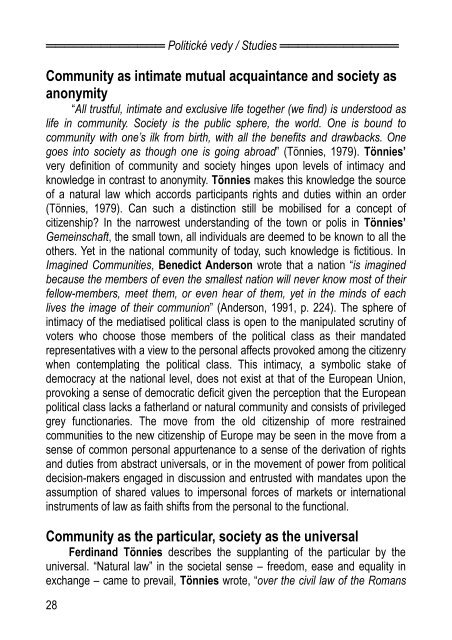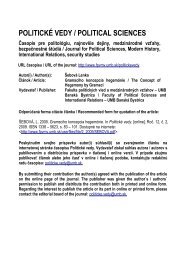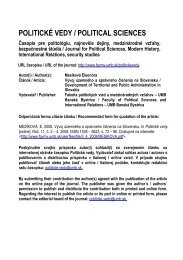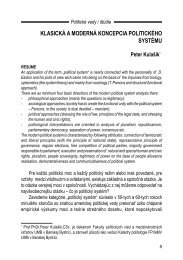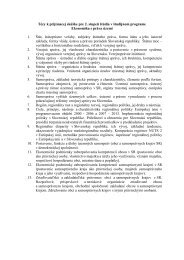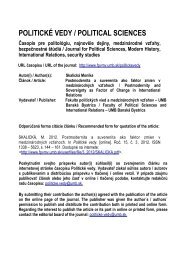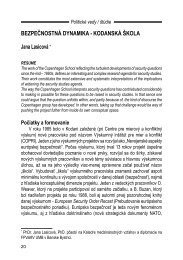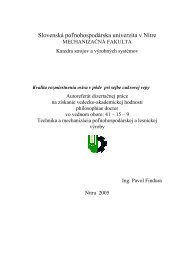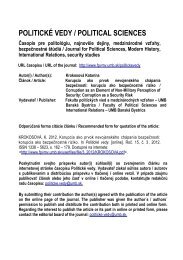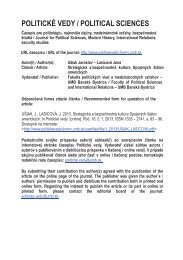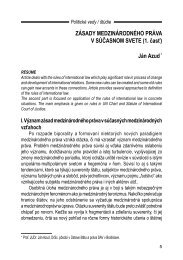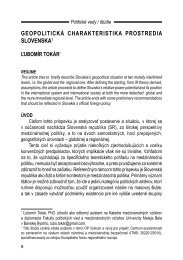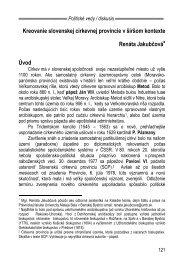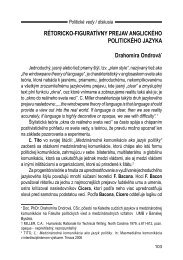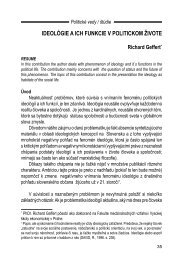Citizenship in Community and Society: Ferdinand ... - Politické vedy
Citizenship in Community and Society: Ferdinand ... - Politické vedy
Citizenship in Community and Society: Ferdinand ... - Politické vedy
You also want an ePaper? Increase the reach of your titles
YUMPU automatically turns print PDFs into web optimized ePapers that Google loves.
═════════════ Politické <strong>vedy</strong> / Studies ═════════════<br />
<strong>Community</strong> as <strong>in</strong>timate mutual acqua<strong>in</strong>tance <strong>and</strong> society as<br />
anonymity<br />
“All trustful, <strong>in</strong>timate <strong>and</strong> exclusive life together (we f<strong>in</strong>d) is understood as<br />
life <strong>in</strong> community. <strong>Society</strong> is the public sphere, the world. One is bound to<br />
community with one’s ilk from birth, with all the benefits <strong>and</strong> drawbacks. One<br />
goes <strong>in</strong>to society as though one is go<strong>in</strong>g abroad” (Tönnies, 1979). Tönnies’<br />
very def<strong>in</strong>ition of community <strong>and</strong> society h<strong>in</strong>ges upon levels of <strong>in</strong>timacy <strong>and</strong><br />
knowledge <strong>in</strong> contrast to anonymity. Tönnies makes this knowledge the source<br />
of a natural law which accords participants rights <strong>and</strong> duties with<strong>in</strong> an order<br />
(Tönnies, 1979). Can such a dist<strong>in</strong>ction still be mobilised for a concept of<br />
citizenship In the narrowest underst<strong>and</strong><strong>in</strong>g of the town or polis <strong>in</strong> Tönnies’<br />
Geme<strong>in</strong>schaft, the small town, all <strong>in</strong>dividuals are deemed to be known to all the<br />
others. Yet <strong>in</strong> the national community of today, such knowledge is fictitious. In<br />
Imag<strong>in</strong>ed Communities, Benedict Anderson wrote that a nation “is imag<strong>in</strong>ed<br />
because the members of even the smallest nation will never know most of their<br />
fellow-members, meet them, or even hear of them, yet <strong>in</strong> the m<strong>in</strong>ds of each<br />
lives the image of their communion” (Anderson, 1991, p. 224). The sphere of<br />
<strong>in</strong>timacy of the mediatised political class is open to the manipulated scrut<strong>in</strong>y of<br />
voters who choose those members of the political class as their m<strong>and</strong>ated<br />
representatives with a view to the personal affects provoked among the citizenry<br />
when contemplat<strong>in</strong>g the political class. This <strong>in</strong>timacy, a symbolic stake of<br />
democracy at the national level, does not exist at that of the European Union,<br />
provok<strong>in</strong>g a sense of democratic deficit given the perception that the European<br />
political class lacks a fatherl<strong>and</strong> or natural community <strong>and</strong> consists of privileged<br />
grey functionaries. The move from the old citizenship of more restra<strong>in</strong>ed<br />
communities to the new citizenship of Europe may be seen <strong>in</strong> the move from a<br />
sense of common personal appurtenance to a sense of the derivation of rights<br />
<strong>and</strong> duties from abstract universals, or <strong>in</strong> the movement of power from political<br />
decision-makers engaged <strong>in</strong> discussion <strong>and</strong> entrusted with m<strong>and</strong>ates upon the<br />
assumption of shared values to impersonal forces of markets or <strong>in</strong>ternational<br />
<strong>in</strong>struments of law as faith shifts from the personal to the functional.<br />
<strong>Community</strong> as the particular, society as the universal<br />
Ferd<strong>in</strong><strong>and</strong> Tönnies describes the supplant<strong>in</strong>g of the particular by the<br />
universal. “Natural law” <strong>in</strong> the societal sense – freedom, ease <strong>and</strong> equality <strong>in</strong><br />
exchange – came to prevail, Tönnies wrote, “over the civil law of the Romans<br />
28


